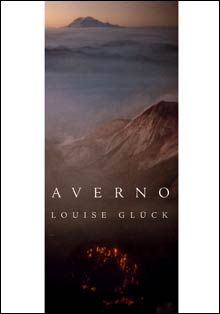 “Always nights I feel the ocean, biting at my life,” Louis Glück wrote in Firstborn (1968), her first volume of poetry. Ever since then, mortality has haunted her work, sex and death bound together — often violently. In her much anthologized scorcher, “Mock Orange,” she wrote,
“Always nights I feel the ocean, biting at my life,” Louis Glück wrote in Firstborn (1968), her first volume of poetry. Ever since then, mortality has haunted her work, sex and death bound together — often violently. In her much anthologized scorcher, “Mock Orange,” she wrote,
It is not the moon, I tell you.
It is these flowers
lighting the yard.
I hate them.
I hate them as I hate sex,
the man’s mouth
sealing my mouth, the man’s
paralyzing body —
In her latest, Averno, she confronts these pretty spring flowers, revisiting the myth of Persephone, in whose story sex and death became one. Rescued from Hades, the daughter of Zeus and harvest goddess Demeter must still spend half the year in the Underworld. This joint-custody arrangement takes on an almost spiritual cast in Averno, which unfolds in 18 lyrics. The poems have Glück’s typical short line, her elegant rhythms. Few American poets can do so much with so little, as in “The Night Migrations”:
This is the moment when you see again
the red berries of the mountain ash
and in the dark sky
the birds’ night migrations.
It grieves me to think
the dead won’t see them —
these things we depend on,
they disappear.
 One glimpse of the tangible world — and then the second quatrain whisks it away. The poems in Averno repeat this metaphysical pick-pocketing over and over, as if reminding us that the story of Persephone is ours, too. No one gets to keep his or her body forever.
One glimpse of the tangible world — and then the second quatrain whisks it away. The poems in Averno repeat this metaphysical pick-pocketing over and over, as if reminding us that the story of Persephone is ours, too. No one gets to keep his or her body forever.
Glück writes with oracular bottom to her voice — she can borrow from mythology’s authority without appearing to inhabit it in drag. “Didn’t we plant the seeds,” she pleads, her voice overlapping with that of Persephone, “weren’t we necessary to the earth,/the vines, were they harvested?”
Some of the richest poems come during her tour through the underworld, as she meditates on death and the past, how imagination can string a foot bridge between the two. “When I was still very young/ my parents moved to a small valley/ surrounded by mountains. . . . From our kitchen garden/you could see the mountains/snow covered, even in summer.” Some youngsters might have been chilled by this glimpse of an eternal winter, but not Glück: “I remember peace of a kind/I never knew again.”
If her previous book, The Seven Ages, looked mortality in the face, stared it down, this one makes a separate peace. To do so, she interrogates the myth of Persephone for falsehood and fractures. She muses on the meaning of the soul. The best poems engage Persephone’s story with something personal at stake.
In “A Myth of Devotion,” Gluck imagines Hades preparing the underworld for Persephone:
He wants to say I love you, nothing can hurt you
but he thinks
this is a lie, so he says in the end
you’re dead, nothing can hurt you
which seems to him
a more promising beginning, more true.
And so, “Spring will return, a dream/based on a falsehood:/that the dead return.” This is grim wisdom. But Averno feels made from experience, as though Glück had gone down to the underworld herself to confirm what we all know to be true.
Louise Glück | April 5, 6:30 pm | Harvard Hillel, 52 Mount Auburn St, Cambridge | 617.661.1515